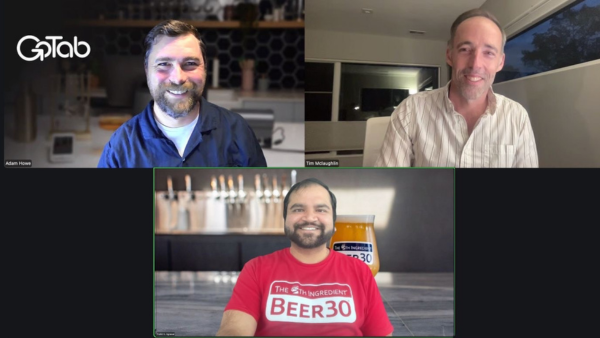Brewing Smarter: How Beer30 and GoTab CEOs Are Leading Data-Driven Growth Across Global Markets

In the latest episode of Behind the Tab, GoTab’s Director of Product Enablement, Adam Howe, sat down with Pulkit Agrawal, Founder and CEO of The 5th Ingredient (makers of Beer30), and Tim McLaughlin, Co-Founder and CEO of GoTab, for a deep-dive conversation on entrepreneurship, adaptation, and the evolution of brewery technology. From Virginia to Brisbane, both leaders have built companies shaped by the same foundational principle — that data, when shared and acted upon, can transform hospitality operations worldwide.
From Brew Decks to Dashboards: How Data Became the “Fifth Ingredient”
Agrawal’s journey started at Ballast Point Brewing, where he applied his mechanical engineering background to improve bottling, canning, and kegging efficiencies. But what he saw behind the scenes sparked a bigger idea: breweries were swimming in production data yet still relying on whiteboards and spreadsheets.
“The fifth ingredient — after water, malt, hops, and yeast — is data,” Agrawal explained. “Our mission with Beer30 was to help breweries use their data to make smarter, faster, more profitable decisions.”
Eight years later, Beer30 now powers over 450 breweries in 25 countries, helping operators move from manual logs to digital insights that drive production, distribution, and accounting efficiency.
Open APIs and Operator Empowerment: GoTab’s Journey from QR to POS
For McLaughlin, GoTab’s origin story traces back to Caboose Brewing Co., the brewery he and his wife opened in Virginia in 2015. There, he encountered a different version of the same problem: hospitality systems that locked operators out of their own data.
“Coming from the enterprise-software world, it never occurred to me that businesses wouldn’t have access to their data,” he said. “When POS systems wouldn’t integrate with us, we had to build our own. That’s why we decided to keep the doors open for everyone else.”
That open-integration philosophy now defines GoTab’s ecosystem, which boasts 200+ partner integrations — from recipe and food costing software to taproom operations tools like Beer30. McLaughlin calls it a “win-win” for operators: “If our partners help them succeed, we succeed too.”
Lessons from the Australian Market: Collaboration Across Continents
Both Beer30 and GoTab are rapidly expanding in Australia. It’s a market that mirrors the U.S. craft-beer scene of a decade ago. Beer30’s first Australian customer signed on in 2019, and today, one in six breweries there runs on the platform.
“Australia was ready for a data-driven shift,” Agrawal said. “They helped us build features like Xero integration and a two-click excise-tax report, something no one else was offering at the time.”
For GoTab, the appeal is equally clear: Australian operators embraced QR ordering long before it became mainstream. “It’s a market where our DNA: our flexibility, openness, and mobile service, really fits,” McLaughlin shared. With a growing Sydney- and Melbourne-based team, GoTab is investing heavily in regional partnerships and on-the-ground support.
Building Together: Feedback, Flexibility, and the Future
Despite their global reach, both CEOs agree their success depends on listening to operators. Agrawal describes Beer30’s roadmap as “crowdsourced,” built from hundreds of brewer interviews and user-driven improvements.
“We’re not aiming for perfect on day one,” he said. “We get it out there, get feedback, and iterate — because the best ideas come from the brewers themselves.”
McLaughlin echoed that sentiment: “Every feature request is really a symptom of a deeper problem. Our job is to find the root cause and fix that for everyone.”
Lessons in Leadership: Failures That Fueled Growth
Both founders credit early missteps as critical to their evolution. Agrawal recalls investing hundreds of hours building a keg-tracking module that few breweries adopted — a reminder that “what customers say they want isn’t always what they’ll use.”
McLaughlin reflected on GoTab’s own turning points: “Old habits die hard. We started with QR ordering in 2018 — years ahead of its time — but it wasn’t until COVID that it took off. We had to pivot fast, then reinvent again when QR fatigue hit.”
Their shared takeaway: resilience, humility, and a willingness to kill ideas that no longer serve the mission.
From the brew deck to the POS terminal, Beer30 and GoTab are proving that data-driven collaboration isn’t just about software — it’s about empowering operators to think, adapt, and lead with agility. Whether it’s a two-click tax report or a taproom guest service model that runs entirely on QR codes and mobile devices, these companies are redefining what it means to serve smarter — and brew better — in 2025 and beyond.
Listen to the full conversation on the Behind the Tab Podcast.
🎧 Stream on Spotify | 📺 Watch on GoTab's YouTube Channel👂Listen on Apple Podcasts

Tap Room Playbook Episode 2:
When you really think about it, with everything managers need to do in a tap room, the hospitality aspect is often overlooked.
Watch Now →.webp)
Tap Room Playbook Episode 3:
The best breweries pay attention to what their brand stands for. How do the best brewers bring their brand to life?
Watch Now →
